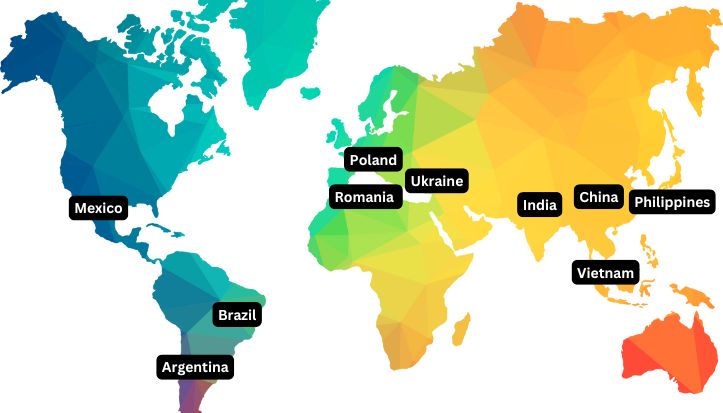
In today’s online world, having the right set of developers is key to a project’s success. More and more businesses are moving towards outsourcing IT talent to scale their projects. The global market for custom software development, particularly focused on outsourcing dedicated developers, is expected to grow from $28.2 billion to $185.1 billion by 2030, at a CAGR of 21.5% to 22.4%. The demand for software developers continues to grow as they bring specialized skills and work solely on your project. This way, they can focus on creating custom solutions tailored to your business needs.
This guide aims to walk you through how to hire software developers what to look out for, steps to hire and mistakes to avoid while hiring developers in 2024.
When to Hire Software Developers?
Before you get into how to hire software developers, it’s important to know when you actually need them. Knowing the right time & reasons to hire can save you time and help your projects succeed!
- You are working on Long-term Projects:
Imagine you’re building an e-commerce platform and it’s going to take 18 months. With dedicated software developers, you have a steady team working and you manage your budget with fixed monthly costs.
- Your Project Scope is unclear:
Launching a startup and expect your product to change with user feedback? A dedicated development team can adjust to these changes, helping your project stay on course.
- You have skill shortages:
You need a blockchain project done but don’t have the right skills in your team. Dedicated blockchain developers bring the expertise you need.
- Your In-house Team is overloaded:
Your team is already busy with other projects and now there’s a new important project from a big client. Dedicated Software Developers can work on this new project, making sure it’s done on time without making your team too busy.
- You want quick scalability:
A new project needs more developers quickly. Hiring dedicated developers lets you add more team members quickly to meet the project’s needs.
- You are switching to an agile development methodology:
Switching to the Agile framework method for quicker and better project handling? Dedicated developers, known for their flexible and step-by-step approach, are a great match for this style.
- You have a budget limit:
Budget limits exist, yet deadlines are near. The set price with dedicated developers helps plan finances better without losing quality.
- You want a Long-term strategic relationship:
Want a lasting partnership with a development team that understands your business in and out? Hiring dedicated developers creates this bond and strategic alliance.
- You are working on Special Projects:
Planning a groundbreaking AI-based product but don’t have the right experts? Dedicated developers with AI skills can make it happen.
- You are transitioning into new tech:
Transitioning from old to modern tech is a big step. Dedicated developers help make this change smoothly, reducing downtime and keeping your business running.
What to look for while Hiring Software Developers?
Choosing the right dedicated developers is key to your project’s success. Here are the qualities to look for, tailored to the size and stage of your organization:
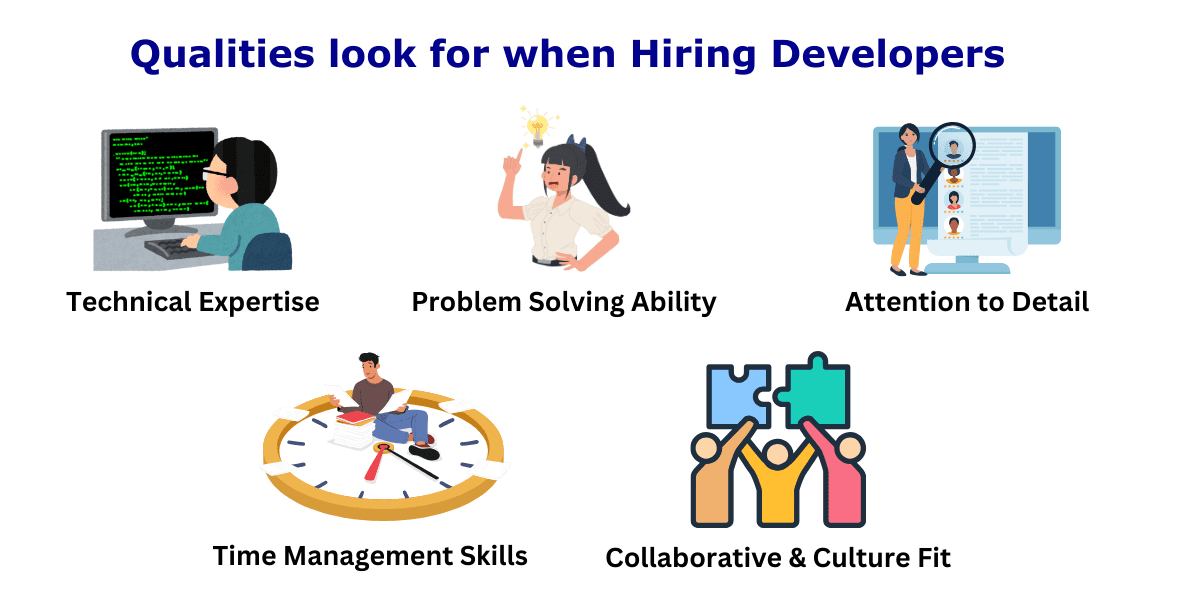
Technical Expertise
- Startup: Seek developers who are versatile and skilled in multiple technologies. They should be quick to adapt to the evolving needs of today’s fast-paced world.
- SMB: Focus on developers who have strong skills in the core technologies your business relies on, ensuring they can handle your key projects and support growth.
- Large Organization: Opt for developers with specialized expertise in specific areas that align with your long-term project requirements.
Problem-Solving Ability
- Startup: Pick thinkers who can solve unexpected problems efficiently, crucial in a fast-paced environment. Check their ranking across platforms like Hacker Rank, Codechef and Leet Code.
- SMB: Developers should be able to address immediate challenges and also strategize for long-term solutions, balancing day-to-day operations with future planning.
- Large Organization: Look for individuals who can navigate and resolve complex issues, enhancing system efficiencies and project outcomes.
Time Management Skills
- Startup: Developers must efficiently manage multiple tasks and tight deadlines in a fast-paced environment. Look for experience with time management tools like Trello or Jira.
- SMB: Developers should balance short- and long-term projects, delivering on time while adapting to evolving business needs.
- Large Organization: Developers need strong time management to coordinate complex projects and meet structured deadlines. Experience with time-tracking tools is a plus.
Collaboration and Culture fit
- Startup: Developers need to collaborate closely with small teams, often taking on cross-functional roles and jelling up with a team.
- SMB: Good team collaboration skills are vital for keeping projects on track and achieving business goals.
- Large Organization: Developers must be adept at working with diverse teams across different locations and possibly time zones.
Professional Steps to Hire Software Developers
Deciding to hire dedicated software developers is crucial, whether you are starting out or growing your business. The right team can really move your project forward. But, hiring needs careful steps to ensure a good match in skills and work culture. The guide ahead offers a clear path during this hiring journey, helping you start this important task with confidence.
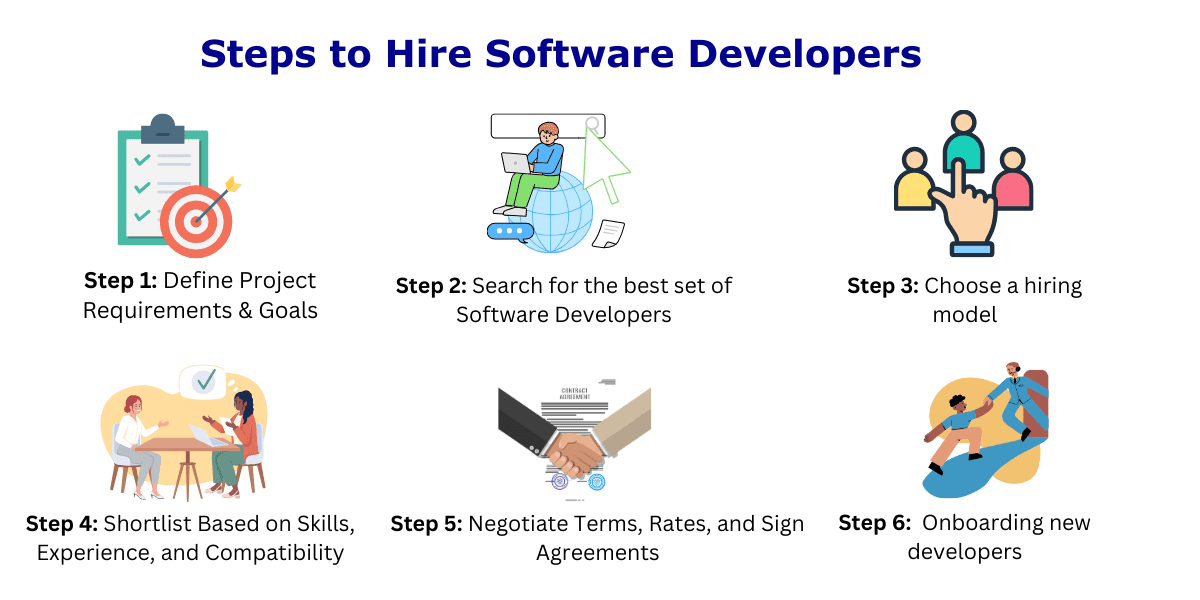
Step 1: Define Project Requirement & Goals
Defining your project needs and setting clear goals are crucial for successful hiring. This is where you picture the final product and list the steps to get there.
- Project Goals: Are your goals short-term or long-term? Know what you want to achieve.
- Features and Functionalities: List the key features your project needs, like user login or payment processing.
- Technology Stack: Pick the technologies that fit your project, like React for a web app.
- Budget and Timeline: Set a budget and a timeline with important milestones.
- Roles and Responsibilities: Identify the roles needed for the project, like developers or designers, and what they will do.
- Risk Assessment: Plan how to handle risks that might come up during development.
With clear project needs and goals, you are ready to communicate well with potential developers, ensuring they know what is expected.
Step 2: Search for the best set of Software Developers
Once you have a clear vision of your project, it’s time to find the right people or organisations to help bring it to life. Here’s where to look for them:
a) Software Development Company: Software Development Companies are a reliable choice when looking to hire software developers, especially from India, making it one of the top countries to hire software developers. Reputable IT outsourcing companies in India like Softlabs Group, specialize in providing highly skilled remote Indian developers experienced in various technologies and industries.
Click here to hire dedicated developers right away!
b) Research and Recommendation: Get suggestions from your network, particularly those with similar projects. Look online for developers specialising in your required technologies.
c) Freelance Platforms: Check platforms like Upwork, Toptal, and Freelancer for experienced developers.
e) Social Media and Professional Networks: Use sites like LinkedIn to find professional developers.
f) Online Communities: Join development forums and post your needs.
g) Recruitment Agencies: Reach out to agencies focused on tech roles.
h) Co-working Spaces: Network in co-working spaces to find developers seeking new projects.If you’re looking to streamline this process and ensure you get the best talent, consider our services to hire dedicated developers who can meet your specific project needs.
Step 3: Choosing the right hiring model
Time and Material Model
The Time and Material model is flexible, allowing companies to hire software developers based on the actual time and resources spent on a project. This approach is ideal for projects where the scope and requirements may change over time. It ensures that you only pay for the work completed, making it a suitable option for ongoing or evolving tasks.
Suitable for: Projects with changing requirements and flexible timelines.
Fixed Price Model
The Fixed Price model is perfect for companies with a well-defined project scope and budget. When you hire software developers using this model, the total cost to hire software developers is agreed upon upfront, ensuring no unexpected expenses. This approach works well for projects with clear timelines and deliverables.
Suitable for: Projects with a fixed scope and defined budget.
Dedicated Team Model
In the Dedicated Team model, you hire software developers who work exclusively on your project, functioning as an extended part of your team. This model is ideal for long-term projects requiring ongoing collaboration and flexibility. It provides full control over the development process and consistent communication with the hired developers.
Suitable for: Long-term projects needing continuous collaboration and flexibility.
Step 4: Shortlist Based on Skills, Experience, and Compatibility (Most Important)
After picking where to look for developers, it’s key to shortlist them based on their skills, experience, and how well they fit with your project. So let’s go through how you can carefully pick and shortlist potential developers for your work:
A) Evaluate Skills and Experience:
- Review Portfolios: Ask for portfolios from developers or companies to see their past work, which is especially useful with outsourcing companies with varied projects.
- Technical Skills: Ensure they have the needed technical skills for your project. If looking at a company, check if they have a range of skills.
- Industry Experience: Check if they or the company have worked on similar projects or in your industry, for smoother collaboration.
- Continuous Learning: Look for signs they keep learning and stay updated with new tech and trends, to get knowledgeable and current developers or companies.
B) Check Compatibility:
• Work Ethic: Find developers or companies that are dedicated, trustworthy, and can finish tasks on time, just like how things are done in your organization.
• Cultural Fit: Make sure their way of working and values are similar to yours, which is important for working well together, especially with companies from other
C) Shortlist Candidates:
• Create a Shortlist: Make a list of developers or companies that look good from your research.
• Compare: Look at their skills, past work, how well they get along with you, and the cost to find the best fit.
• Prioritize: Put the ones that fit your project needs the most at the top of your list.
• Test Projects: Think about giving them a small project or task first, to see how they solve problems and handle work, especially to see how outsourcing companies do with real tasks and delivery.
Step 5: Negotiate Terms, Rates, and Sign Agreements
After checking references and past work, it’s time to talk money and agreements with your chosen developers or developer outsourcing company. This step is all about making sure everyone is on the same page about the work, the pay, and the rules of working together. Follow the tips ahead to make this part smooth and clear for both you and the developers.
Define Deliverables
Clearly outline project deliverables, timelines, and milestones. Agree on how scope changes will be managed to ensure flexibility. A clear understanding of expectations reduces the risk of project delays and miscommunication.
Agree on Rates and Payment
Discuss and finalize rates—whether hourly, per milestone, or fixed price. Studies show that 55% of software development projects go over budget due to unclear cost agreements. Define payment schedules tied to deliverables to avoid misalignment.
Sign Legal Agreements
Sign a contract covering project scope, ownership rights, and confidentiality. Contracts prevent 38% of disputes in software projects, ensuring both parties are legally protected.
Step 6: Onboarding New Developers
After finalising the terms, it is time to get the developers on board and ready to work with your team. Whether they are nearby or far away, a good start is important This step is about making them feel at ease, explaining their roles, and giving them the tools, they need to get going on your projects.
Important steps to note are:
Resource Handover: Make sure they have all the tools and access to systems to do their job well.
Training: Have sessions to teach them the tools and processes they will use in your projects.
Mentor Assignment: Give them a buddy from your team to help them settle in.
Regular Catch-ups: Have regular meetings to see how they’re doing and give helpful feedback.
Mistakes to Avoid When Hiring Software Developers
Now that you know how to look for quality developers, it’s essential to tread with caution. Even with the best intentions, it’s easy to stumble upon common pitfalls. That’s why we’ve detailed the mistakes to avoid when hiring dedicated developers. By being aware and proactive, you can sidestep these errors and ensure a smooth and efficient hiring journey.
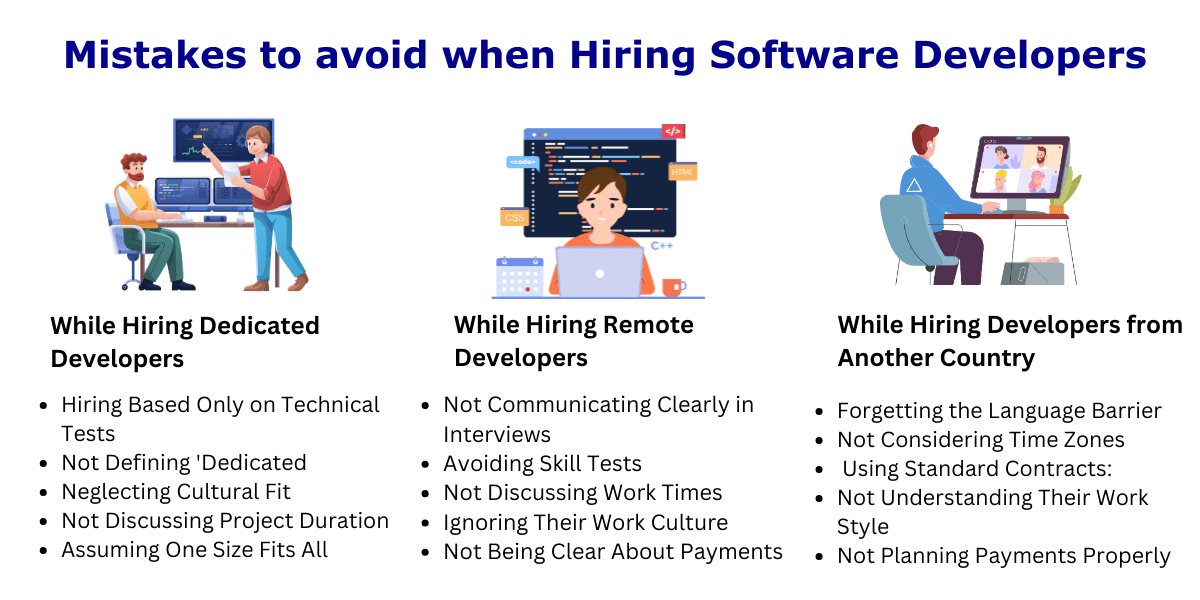
General Hiring Mistakes for Dedicated Developers:
1)Hiring Based Only on Technical Tests:
- Problem: A developer is more than just their coding skills.
- Fix: Assess their problem-solving approach, their adaptability, and how they handle feedback.
2)Not Defining ‘Dedicated’:
- Problem: Your definition of a dedicated developer might differ from theirs.
- Fix: Specify what you mean by dedicated—full-time, exclusive to your project, etc.
3)Neglecting Cultural Fit:
- Problem: Even a skilled developer might not gel with your company culture.
- Fix: Discuss company values and see if they resonate with the developer’s outlook.
4)Not Discussing Project Duration:
- Problem: They might be looking for short-term projects, while you need long-term commitment.
- Fix: Clearly state the expected project duration and any potential for future projects.
5)Assuming One Size Fits All:
- Problem: Every dedicated developer has unique strengths.
- Fix: Instead of a generic job role, tailor the role based on the developer’s strengths and your project’s needs.
Standard Methodologies, Transparent Pricing
Mistakes When Hiring Remote Developers:
1)Not Communicating Clearly in Interviews:
- Problem: Without good communication, you might not fully understand a developer’s skills.
- Fix: Use video chats when interviewing. Make sure you explain the project well and listen to how they respond.
2)Avoiding Skill Tests:
- Problem: Just looking at a resume might not tell you everything about a developer’s abilities.
- Fix: Give them a task or a test. It’s a practical way to see their skills in action.
3)Not Discussing Work Times:
- Problem: If they’re in a different time zone, they might be working when you’re off.
- Fix: Before hiring, discuss and decide on work hours that suit both of you.
4)Ignoring Their Work Culture:
- Problem: Different countries have different work practices.
- Fix: During your chats, discuss their typical work habits, breaks, and local holidays.
5)Not Being Clear About Payments:
- Problem: If you’re not clear about payment details, it can lead to issues later.
- Fix: Talk openly about the payment amount, frequency, and method.
Mistakes When Hiring Developers from Another Country:
1) Forgetting the Language Barrier:
- Problem: Language differences can make communication hard.
- Fix: Test their language proficiency early on. Use translation tools if needed.
2) Not Considering Time Zones:
- Problem: It can be frustrating when your available hours don’t match.
- Fix: Plan your interviews at times that are convenient for both of you.
3) Using Standard Contracts:
- Problem: A usual employment agreement might not cover international specifics.
- Fix: Ensure your contract is suitable for hiring from another country.
4)Not Understanding Their Work Style:
- Problem: Every country has its unique work habits.
- Fix: Spend time learning about how they typically work and what they expect.
5)Not Planning Payments Properly:
- Problem: International payments can sometimes be complicated.
- Fix: Discuss the method of payment, and the currency, and decide who will cover any transaction fees.
Remote developers are adaptable and ready to switch tools or adjust their working style. This ensures they can meet the diverse needs of any business.
Legal Issues to Consider Before Hiring a Dedicated Software Developer
Now that you’ve explored the differences between dedicated developers and freelancers, it’s important to understand the legal considerations. Let’s dive into what you need to know before hiring a dedicated developer to make sure everything goes smoothly.
1) Contract Agreements
Clarity on Scope of Work: Ensure the contract specifically outlines the tasks and responsibilities of the developer. This includes detailed descriptions of the project deliverables, deadlines, and quality standards.
Payment Terms: Define how payments will be made (e.g., milestones, monthly, upon completion), including any upfront deposits required.
Termination Clauses: Include clear terms under which either party can terminate the contract, such as breach of contract, failure to meet deadlines, or budget constraints.
Revision and Overrun Policies: Specify how revisions to work or project overruns are handled, including who bears the additional costs.
2) Intellectual Property (IP) Rights
Ownership of Created Works: Confirm that the contract states all work created by the developer during the project is your company’s property.
Use of Existing Code: Address whether the developer can use their existing code or third-party code, and who owns these elements.
IP Rights upon Termination: Make sure rights to the work done are clearly defined even if the contract is terminated.
3) Non-Disclosure Agreements (NDAs)
Scope of Confidential Information: Clearly define what information is considered confidential. This can include project details, business strategies, customer data, and technical processes.
Duration of the NDA: Specify how long the confidentiality requirements last, which might extend beyond the term of the contract.
Actions upon Breach: Outline the consequences if confidential information is disclosed.
4) Compliance with Laws
Data Protection and Privacy: Ensure the developer and the outsourcing company follow relevant data protection laws, especially if dealing with sensitive or personal data.
Work Laws and Standards: Verify that they comply with the labour laws and professional standards of their country and yours, especially if outsourcing internationally.
Security Protocols: Check that they have robust security measures in place to protect your data and intellectual property.
5) Liability Clauses
Indemnity: Include indemnity clauses to protect against losses due to the developer’s actions. This can cover data breaches or IP rights infringements.
Limitation of Liability: Clearly state any limitations on liability, such as caps on financial liability or exclusions for indirect damages.
Warranties: Ensure there are warranties that cover the performance of the work and compliance with specifications.
6) Dispute Resolution
Preferred Method for Dispute Resolution: Outline the preferred method for resolving disputes (mediation, arbitration, litigation).
Jurisdiction and Law: Specify which country’s law will govern the contract and where any legal disputes will be resolved.
Steps Before Formal Proceedings: Consider requiring negotiation or mediation before moving to arbitration or litigation to save time and resources.
How to Hire Software Developers from Softlabs Group?
Once you’ve selected a hiring model that suits your needs, the next step is to initiate the process of hiring a dedicated developer from us. Here’s a simple guide to get you started:
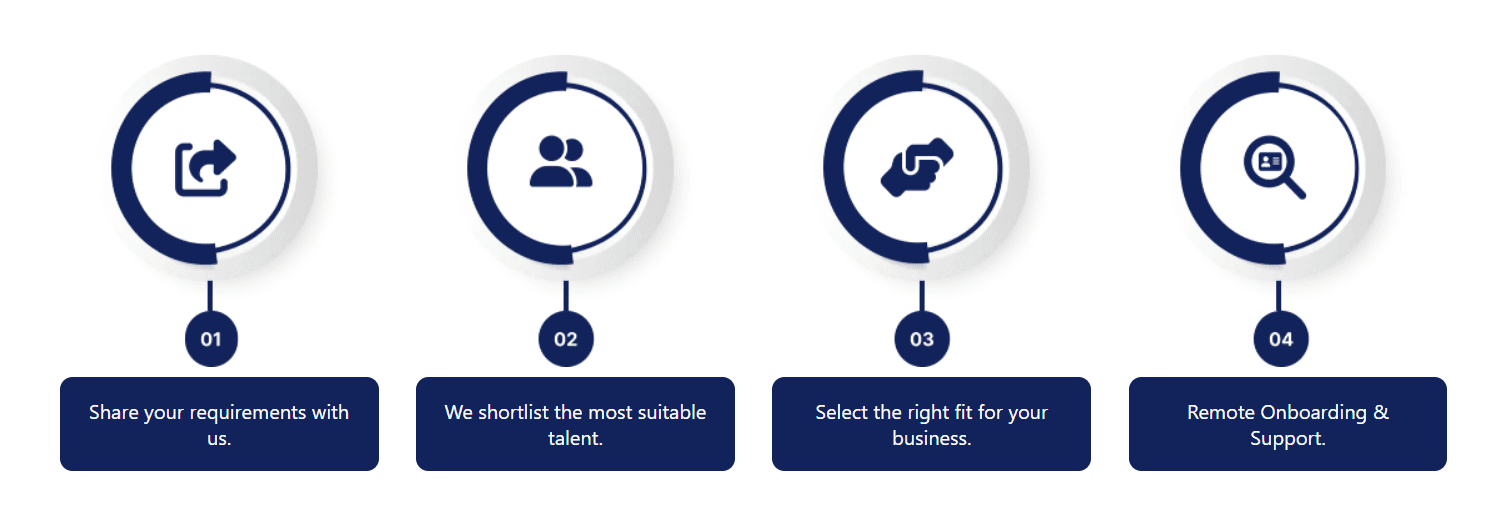
Now that you’re familiar with our hiring models and process, here are the dedicated software developers you can work with, each specialized in various technologies to meet your project’s needs.
Click to hire these software developers right away!
Also, check the success stories of our developers!
1) Artificial Intelligence for Product Safety

Explore AI for Workplace Safety Case Study
2) Artificial Intelligence for Product Safety

Explore AI for Material Safety case study
3) Dating Application

Explore Dating Application case study
4) Investment Portfolio
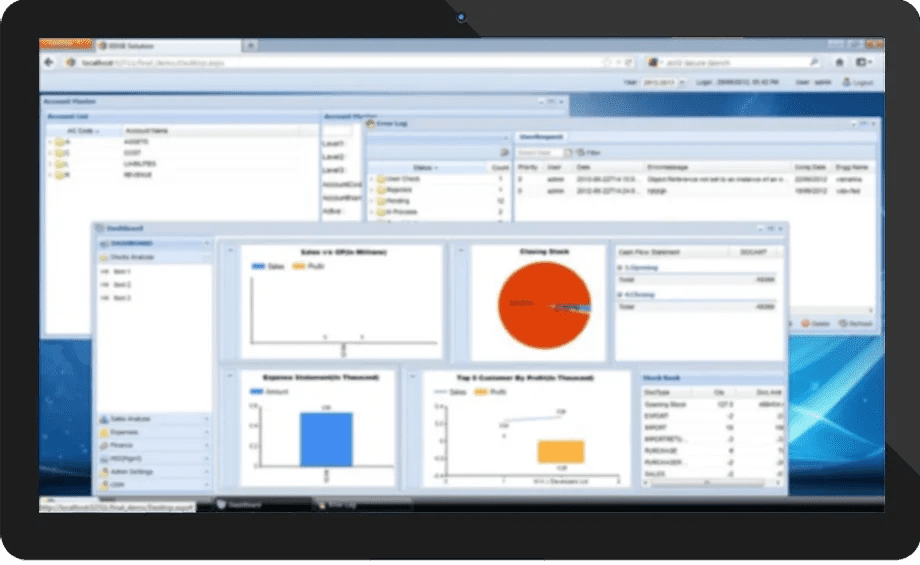
Explore Investment Portfolio case study
5) Food Delivery App

Explore food delivery app case study
6) Online Educational Portal
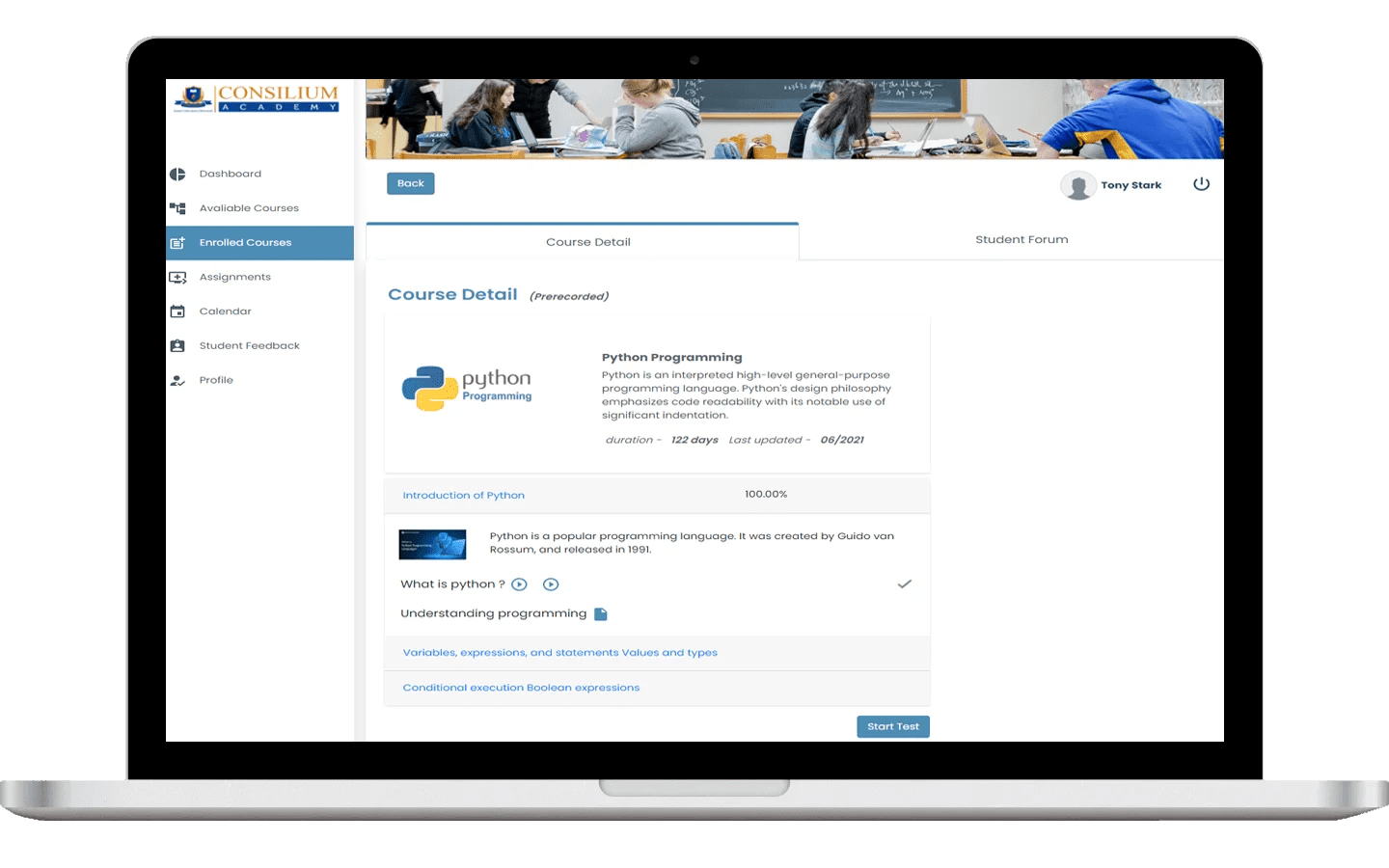
Explore online educational portal case study
Final Note
Now I hope this blog helps you find the right developer to work on your projects. We’ve given you all the tips you need to pick the best one. Hiring remote software developers can boost your team’s efficiency and give you exceptional results. Also, if you want to hire developers without any trouble, contact us right away! We can quickly connect you with skilled developers who are ready to help you.



